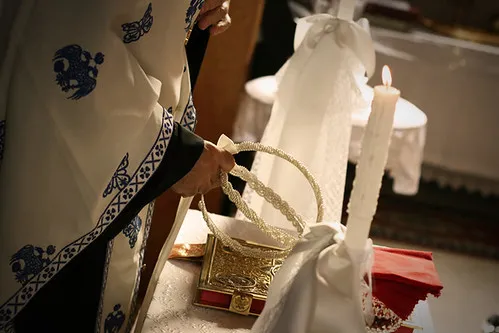December 17, 2023
Burn! You can’t marry.
 Four Weddings and a Funeral is a British movie, released in 1994, about the romantic adventures of Charles, played by Hugh Grant, and his lively group of friends as they support each other through a series of life events. Perhaps one of the most touching and memorable scenes takes place at the funeral of one of the friends, Gareth. It is revealed at the service that Gareth was not only gay but in a relationship with another member of the circle of friends, Matthew. In his eulogy, Matthew said “Gareth used to prefer funerals to weddings. He said it was easier to get enthusiastic about a ceremony one had an outside chance of eventually being involved in.”[1] Not having words himself to speak about the love of his life, Matthew recites the very moving and touching poem Funeral Blues by W.H. Auden.[2] After listening to the eulogy, what friends quickly realize, to their surprise, is that Matthew and Gareth were for “all intents and purposes” a married couple. Unfortunately, they felt that they needed to keep it a secret, even from their friends.
Four Weddings and a Funeral is a British movie, released in 1994, about the romantic adventures of Charles, played by Hugh Grant, and his lively group of friends as they support each other through a series of life events. Perhaps one of the most touching and memorable scenes takes place at the funeral of one of the friends, Gareth. It is revealed at the service that Gareth was not only gay but in a relationship with another member of the circle of friends, Matthew. In his eulogy, Matthew said “Gareth used to prefer funerals to weddings. He said it was easier to get enthusiastic about a ceremony one had an outside chance of eventually being involved in.”[1] Not having words himself to speak about the love of his life, Matthew recites the very moving and touching poem Funeral Blues by W.H. Auden.[2] After listening to the eulogy, what friends quickly realize, to their surprise, is that Matthew and Gareth were for “all intents and purposes” a married couple. Unfortunately, they felt that they needed to keep it a secret, even from their friends.
Such “intents and purposes” and the need to keep secrets are very similar to how it is for those of us who are gay and in serious and committed relationships. We frequently believe we must or are pressured or forced to hide our marital status. Perhaps nowhere is this more acute for LGBTQ couples than in the Orthodox Church. Over the years that this website has existed, we have received numerous emails from Orthodox individuals in long-term, same-sex, committed relationships. Almost to a fault, all of them ask either for a priest who might perform a marriage (crowning) ceremony or a priest who would accept them as a couple in their parish congregation. Almost to a fault, this website has to tell couples seeking a Christ-centered pastorally sensitive priest that such priests, at least openly, are almost non-existent. Indeed pastoral care for sexual minorities in the Orthodox Church is almost completely broken down. In a poignant essay to be found in the book “For I am Wonderfully Made” Mark Stokoe writes: “For example: St. Paul says that it is better to marry than burn, but current pastoral practice requires homosexuals to burn rather than to marry. Monogamous fidelity in marriage for heterosexuals is encouraged to avoid ‘living in sin’; monogamous fidelity in marriage for homosexuals is ‘living in sin’.”[3] Mr. Stokoe goes on to discuss that the Orthodox Church has always recognized that very few individuals are graced with the calling to lifelong celibacy and thus encourages marriage. And yet, for homosexuals, the Church tells us that lifelong celibacy is not an “option, but an obligation.”
The Church has yet to explain this conundrum rationally or provide any logical, pastoral advice to those of us, LGBTQ Orthodox in monogamous relationships. Certainly, this matter needs to be addressed and discussed by the Church, avoiding such unhelpful and even unpastoral suggestions as “God made you gay, you must stay celibate”, or as one critic recently wrote to this website: “You are not gay, you are just spiritually delusional.” One can only pray and hope that when discussing our relationships, the bishops and leaders of the Orthodox Church will include us, and listen to us. To avoid us is to leave members of the flock unattended to or intentionally lost (Luke 15:3-6). That can’t be what Christ would do to those created in His Father’s image and likeness.
[1] https://en.wikiquote.org/wiki/Four_Weddings_and_a_Funeral
[2] https://www.encyclopedia.com/arts/educational-magazines/funeral-blues
[3] For I am Wonderfully Made. Texts on Eastern Orthodoxy and LGBT Inclusion. Eds. Misha Cherniak, Olga Gerassimenko , Michael Brinkschroder. 2016.
